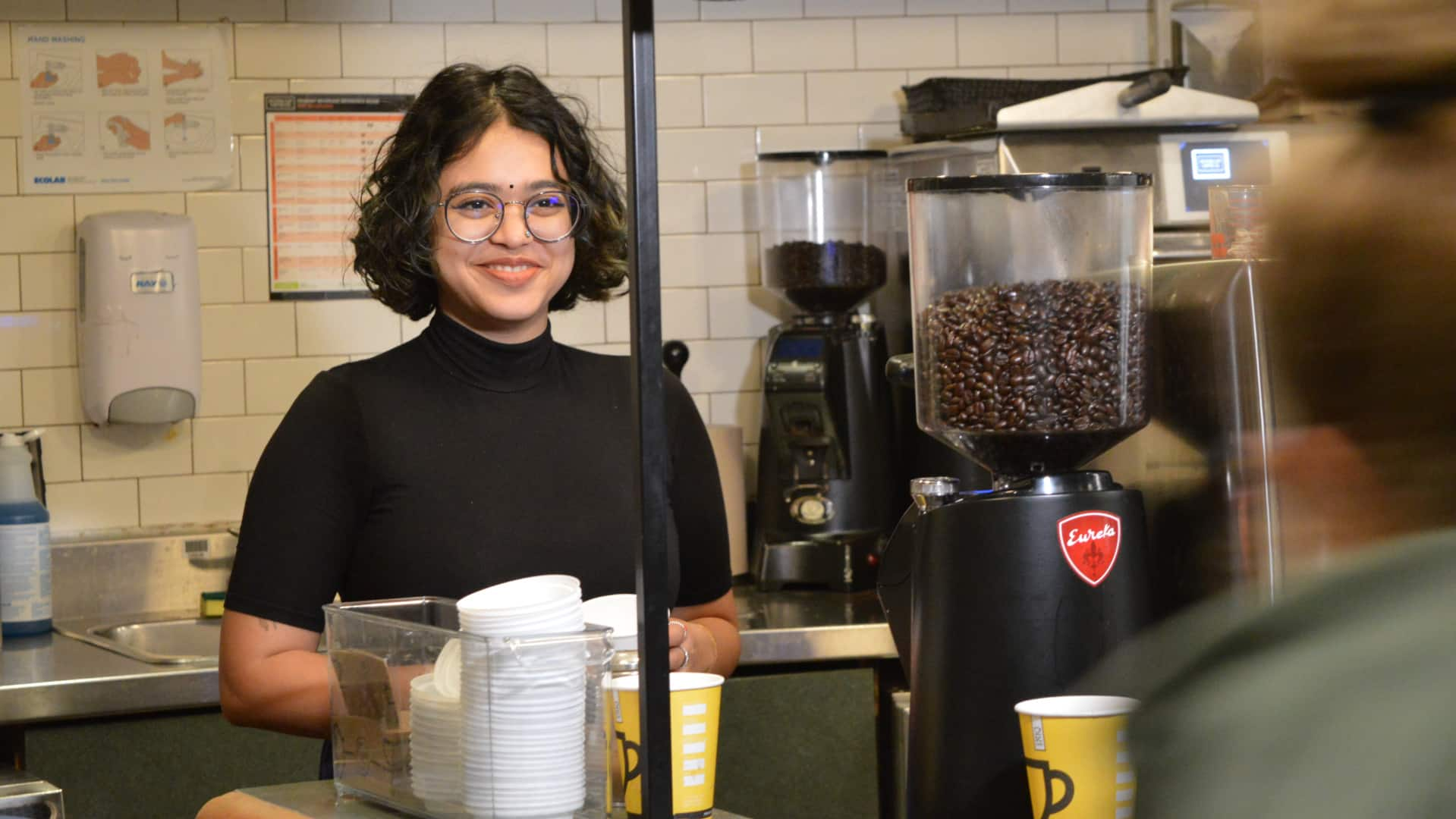In Part 3 of The Grind, Shramana Sarkar is caught between a rock and a hard place
This is Part 3 of The Grind, a new series from CBC Newfoundland and Labrador on people who are working multiple jobs to offset the rising cost of living.
Shramana Sarkar's eyes sparkle when she starts talking about rocks.
The 24-year-old aspiring geologist, an earth sciences teaching assistant at Memorial University, takes her job seriously. That's why she's here in Newfoundland, after all, far away from her aging parents in Kolkata: for a rigorous education and, eventually, a doctorate degree.
But in recent months, Sarkar has found less and less time to study, her dream of becoming a scientist chipped away by the low-paying, precarious jobs that she needs to survive here.
"It's just taking such a huge toll on me," Sarkar says, describing her chaotic schedule in a living room barely big enough for the CBC's camera.
"Once in a while, I will break down."
WATCH | Come along with Sarkar on her daily grind

She’s juggling 3 jobs and grad school — and struggling to get out of bed
23 hours ago
Featured VideoTwo coffee shop jobs, a third job on the side, and a master’s degree to study for. Shramana Sarkar’s daily life is so overwhelming that she struggles to get out of bed some days. But every day, she finds a way. See Sarkar’s story in Part 3 of our series The Grind, profiling people juggling multiple jobs.
It wasn't always this way. Sarkar moved to St. John's for her bachelor's degree in 2018. Back then, she only needed one part-time job to make rent for the month, at a going rate of $350 for a room in a house near MUN's campus.
But times have changed.
"Slowly, over the years, I've had to take on more jobs," she says. "I've seen the shift where from one job, now I have three."
1 in 5 jobs precarious
Sarkar is among a growing number of precarious workers across Canada, according to an October report from the Canadian Association of Chartered Accountants. Precarious workers often don't know how many hours they'll get in a week or whether they'll be employed next month.
The Canadian Centre for Policy Alternatives suspects as many as one in five Canadian workers have precarious jobs. And even those working part time by choice have seen their wages stagnate relative to the cost of consumer goods, according to Statistics Canada.
"There's real insecurity out there," says Walid Hejazi, an economist at the Rotman School of Management in Toronto.
"And I think what's very sad is that the insecurity impacts most vulnerable groups a lot more than the average person. And that's why we're seeing the the explosion in precarious work, the explosion in people having to pick up a second or a third job."
Hejazi wrote an entire book about Canada's sliding prosperity compared with other developed countries. The nation's GDP per capita is on a steady decline relative to other economies, and that manifests in people scrabbling for extra work, second jobs and side gigs.
Hejazi isn't the only one writing about that trend.
"Past generations of young Canadians entering the workforce could look forward to favourable tailwinds lifting real incomes over their working lives," wrote David Williams, a policy expert with the Business Council of British Columbia.
"That's no longer the case … young people entering the workforce today will not feel much of a tailwind at all. Rather, they face a long period of stagnating average real incomes that will last most of their working lives."
Balancing act
Today, Sarkar's rent has doubled. Groceries are 20 per cent more expensive than they were two years ago. But her wages haven't kept up. And none of her three jobs — her teaching position, or either of her two barista gigs — offers enough hours to cover all the basics.
Her schedule isn't overflowing by choice. If rent and inflation remain this high, she says, she'll have little choice but to study somewhere more affordable.
Each morning, she says, she fights with herself to get out of bed, overcome by the long day ahead of her.
"The thought of having to do so many things just sort of paralyzes me," she says. "And I'm unable to do anything about it."
With just one job — one that offered a living wage and more predictable hours — Sarkar says her life would improve dramatically and allow her to focus on the education she moved here for.
"I wouldn't feel like I have this overwhelming amount of things to juggle, like different workplaces and different workplace dynamics," she says. "It's much easier to handle as opposed to … having to rewire your mindset to them every day."
Julia Smith, a labour historian at the University of Manitoba, says Sarkar's plight could describe countless workers across the country.
"I think many people are finding right now it's really hard to even just get out of bed each day and keep going," Smith says.
"Because you also have this feeling … of like, things aren't going to get better. There's a sense of despair, I think.
"It's one thing to say, 'I'm going to work really hard while I'm in grad school for a couple years, but then I'm going to get that job.' But when you have that sense of, 'I'm just going to work really hard forever and I might not even be able to own a home of my own, or ever have a pension,' that's pretty demoralizing."
'There's no other way'
In the past century, Smith says, precarious work was the norm. All that changed about 70 years ago, when workers banded together, helped along by government policies that encouraged higher education and unionization, which allowed employees to fight for better wages and job security.
"The problem is that in a capitalist system … the priority is profit. That is what a capitalist system is intended to do, is to maximize profit," Smith said.
"And so we have a bit of a mismatch, where we are living in a capitalist system and we're kind of expecting it to have a different outcome, you know — where it's going to provide us all with good, meaningful lives."
Behind the counter at a Second Cup in St. John's, Sarkar's all smiles as she steams milk for a latte.
She's grateful for the job. But she wishes she didn't have to run to class, then to her campus office, then home, then to the bus stop for work, worrying the whole time about money and thinking very little about rocks.
She'll be here, making coffees for $15 an hour, until 9 p.m. Then she'll study, sleep, and do it all over again tomorrow.
"I just sort of struggle with this by myself, and it's repeating every day," she says.
"I have to do this. There's no other way right now."
The Grind: Do you have a story to tell?
Get the news you need without restrictions. Download our free CBC News app.

Add some “good” to your morning and evening.
A variety of newsletters you'll love, delivered straight to you.
*****
Credit belongs to : www.cbc.ca
 MaharlikaNews | Canada Leading Online Filipino Newspaper Portal The No. 1 most engaged information website for Filipino – Canadian in Canada. MaharlikaNews.com received almost a quarter a million visitors in 2020.
MaharlikaNews | Canada Leading Online Filipino Newspaper Portal The No. 1 most engaged information website for Filipino – Canadian in Canada. MaharlikaNews.com received almost a quarter a million visitors in 2020.







